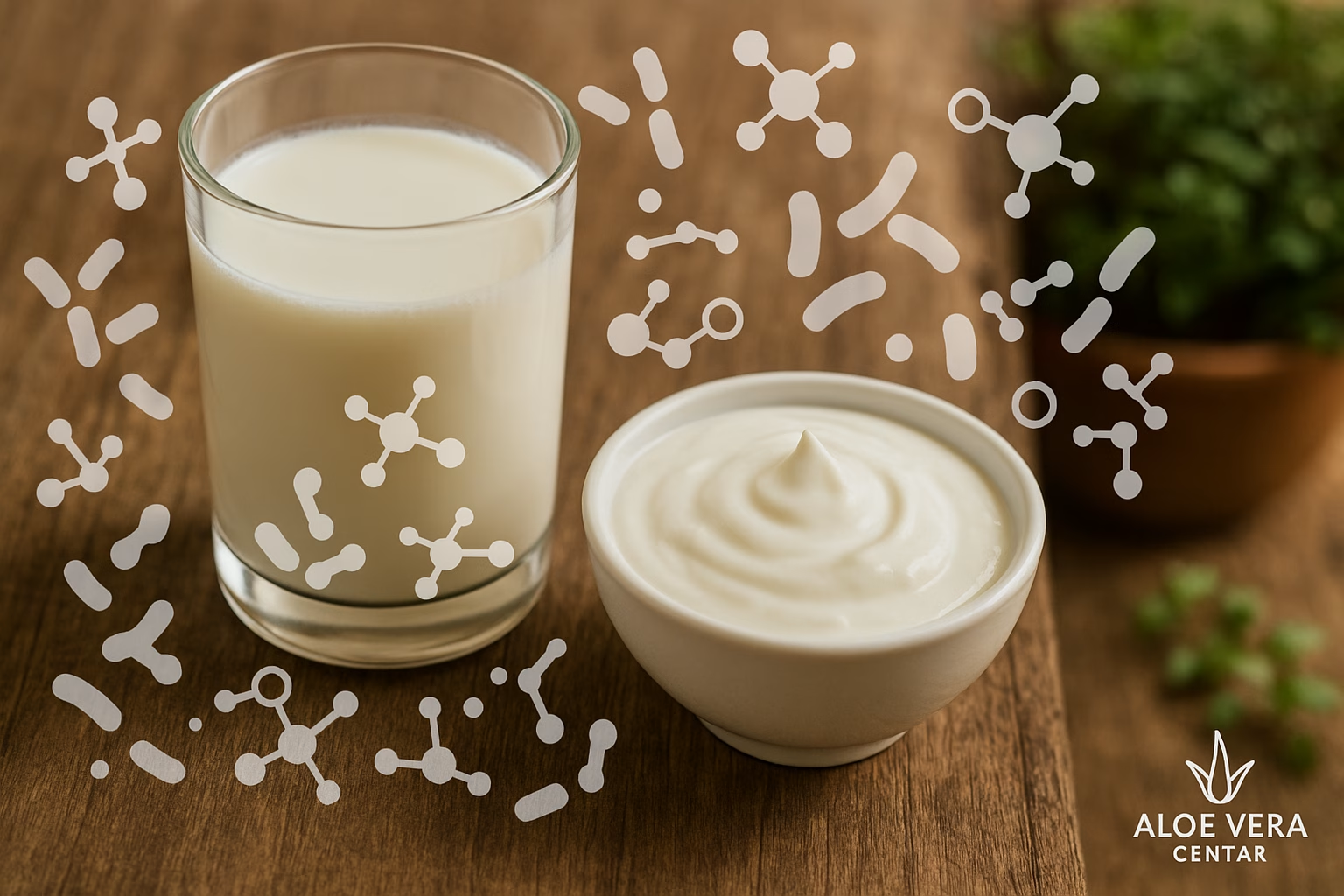
Kefir vs. Yogurt – which is Better for Digestion and Gut Microflora?
Kefir vs. Yogurt: which is Better for Digestion and Microflora?
Kefir has become a real health trend in recent years — but does that mean it should replace your favorite yogurt? Read on to discover how these two fermented drinks differ, why they’re important for your gut microflora, and how to best incorporate them into your daily routine. Wondering why? Keep reading…
What Makes Kefir a Unique Fermented Drink?
Kefir is made by fermenting milk using kefir grains, a symbiotic culture of yeasts and lactic acid bacteria. This is why it contains a wider spectrum of probiotic strains (Lactobacillus kefiri, Saccharomyces kefir, etc.) associated with better gut bacteria diversity.
Regular kefir consumption increased butyrate-producing bacteria concentration by 25% in just four weeks.
Don’t always have time to prepare homemade kefir? Consider a quality Forever Active Pro B probiotic supplement — a practical solution when you’re traveling or simply forget your morning smoothie.
How Does Yogurt Support Gut Health?
Yogurt is made by fermenting milk with cultures of Streptococcus thermophilus and Lactobacillus bulgaricus. Although it typically contains fewer strains than kefir, the amount of live bacteria in quality yogurt can still reach several billion CFU per serving.
Find more expert advice on combining probiotics with diet in our guide.
Nutritional Profile Comparison: Kefir vs. Yogurt
- Proteins: Yogurt contains on average 5-6g of protein per 100g, while kefir offers 3-4g, but has more easily digestible peptides.
- Vitamins: Due to longer fermentation, kefir is rich in B vitamins (especially B12 and folate), while yogurt is slightly higher in calcium.
- Natural sugars: Kefir cultures consume more lactose, so kefir naturally contains up to 30% less sugar than classic plain yogurt.
Here’s the thing: if you’re lactose sensitive, kefir might be a slight favorite due to its lower lactose content and lactase enzymes produced by kefir bacteria.
Impact on Gut Microflora and Digestion
The key to healthy digestion lies in the balance of “good” and “bad” bacteria. Kefir, with over 30 different microorganisms, promotes microbiome diversity, while yogurt provides a high dose of two proven strains that demonstrably calm intestinal inflammation.
To “feed” these beneficial bacteria, combine fermented drinks with soluble fiber like Forever Fiber. Fiber acts as a prebiotic — fuel that bacteria convert into beneficial short-chain fatty acids.
How to Include Kefir and Yogurt in your Daily Routine
Practical tips:
- Morning boost: Mix kefir with chia seeds and fruit for a quick breakfast.
- Protein smoothie: Blend yogurt, banana, and a spoonful of oats after workout.
- Chicken marinade: Kefir’s mild acidity tenderizes meat and adds a tangy flavor.
- Guilt-free dessert: Yogurt with a little honey and cinnamon satisfies sweet cravings.
Need a structured diet plan for healthy digestion? Use our template!
When to Choose Kefir and when to Choose Yogurt?
Have a sensitive stomach? Kefir might be gentler due to its higher pH.
Looking for more protein after exercise? Then reach for Greek yogurt.
Need a quick microbiota reset after antibiotics? Kefir wins due to its diverse strains.
But that’s not all… Consider your taste preferences and digestibility — everyone is different.
Natural Digestive Allies from Aloe Vera Center
For additional gut support, many of our readers successfully combine fermented drinks with Forever Aloe Vera Gel, which thanks to acemannan polysaccharide soothes the mucosa and promotes peristalsis. Find more practical tips in our guide to promoting peristalsis.
Want a personalized approach? Use our AI advisor and get a plan tailored to your digestion in just a few minutes!
Frequently Asked Questions
How much Kefir per Day is Enough?
Just 150-200ml daily has shown measurable benefits for the microbiota. Start slowly and monitor how your body responds.
Can Lactose Intolerant People Drink Kefir or Yogurt?
Kefir contains less lactose and is often better tolerated. However, if you’re highly intolerant, choose fermented drinks made from plant-based milk.
Is Greek Yogurt Better than Regular Yogurt?
Greek yogurt has almost double the protein and a thicker texture, but slightly less calcium due to whey straining.
Kefir and Yogurt Together — Good or Bad Move?
The combination is safe and sometimes desirable as it combines kefir’s strain diversity with yogurt’s high protein content.
Conclusion
Whether you choose kefir or yogurt, regular consumption of fermented drinks is key for balanced microflora, better digestion, and stronger immunity. Kefir leads in strain diversity and lower lactose, while yogurt offers more protein and a pleasant, mild taste.
Ready for the next step? Take advantage of 15% off on digestive support products and start building healthy habits today!
Want to explore probiotics and their effect on digestion even deeper? We recommend reading our article about Active Pro B probiotic and the detailed guide on why Active Pro B is a true ally for healthy digestion. If you’re looking for practical recipes along with probiotics, check out ideas for healthy dinners that will perfectly complement your routine. And for a holistic approach to beauty inside and out, discover our homemade aloe vera hair mask that nourishes the scalp and soothes dandruff.
Note: This article is for informational purposes and is not a substitute for professional medical advice. For specific health concerns, consult with a doctor or qualified healthcare professional.








